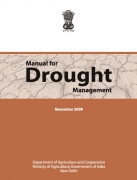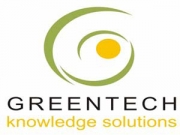/topics/governance
Governance
Manual on drought management by the National Institute Disaster Management and the Ministry of Agriculture (2009)
Posted on 15 Apr, 2010 04:13 PM This manual developed by the National Institute of Disaster Management (NIDM) presents a comprehensive approach to drought management and recommends measures that can be implemented for effective drought relief and mitigation. It brings together conceptual issues, institutional framework & operational details, and replaces the colonial famine codes written largely for dealing with hunger and starvation.
This manual developed by the National Institute of Disaster Management (NIDM) presents a comprehensive approach to drought management and recommends measures that can be implemented for effective drought relief and mitigation. It brings together conceptual issues, institutional framework & operational details, and replaces the colonial famine codes written largely for dealing with hunger and starvation.
It has been prepared with the objective of creating synergy between the various programmes being implemented to provide drought relief and mitigation by several levels of government.
The key issues covered in the manual are:
State-level utilization of funds and assets created through Ganga Action Plan - Report by Planning Commission for the Supreme Court (2009)
Posted on 15 Apr, 2010 03:41 PMThe report was prepared by the Water Resources Division, Planning Commission in response to a Supreme Court directive to verify whether the funds allocated to Ganga Action Plan (GAP) had been duly utilized by the States. The report is based on data obtained from Central Pollution Control Board (CPCB) and Ministry of Environment and Forests (MoEF) and field visits made to plant sites in Uttarakhand, Bihar and Uttar Pradesh.
Solar water heaters in India: Market assessment studies and surveys for different sectors and demand segments by Greentech Knowledge Solutions
Posted on 15 Apr, 2010 11:12 AM The report endeavors to study the Solar Water Heater (SWH) market in India and project a realizable demand till 2022. It looks at the industry structure, supply conditions and value proposition. It relies heavily on interactions with a wide range of stakeholders, such as SWH users, potential SWH users, state level renewable energy development agencies, architects and builders, banks, municipal corporations, electricity distribution companies and pollution control boards.
The report endeavors to study the Solar Water Heater (SWH) market in India and project a realizable demand till 2022. It looks at the industry structure, supply conditions and value proposition. It relies heavily on interactions with a wide range of stakeholders, such as SWH users, potential SWH users, state level renewable energy development agencies, architects and builders, banks, municipal corporations, electricity distribution companies and pollution control boards.
Making climate look like trade? - Questions on incentives, flexibility and credibility - A policy brief by Centre for Policy Research
Posted on 14 Apr, 2010 06:48 PMThe policy brief published by the Centre for Policy Research (CPR), India addresses the debates around climate change that took place before and after the Copenhagen Climate Conference (2009) that raised a number of questions regarding the architecture of the global climate regime.
Climate change threats to India's water resources and emerging policy responses - From the book 'Indian climate policy: Choices and challenges', by the Henry Stimson Centre.
Posted on 14 Apr, 2010 11:01 AMThis book published by Henry L. Stimson Centre highlights the richly diverse nature of India's views on climate change through its range of essays. These essays demonstrate and challenge the international perception of India as a monolithic actor with a single set of opinions and views in the climate change negotiations.
In this chapter, the author discusses the strengths and the weaknesses of India's climate policy in the context of the increasing threats that have been identified to the water resources in the country. The author states that India's climate policy is still in its emerging state and argues that though the policy does highlight many important areas related to climate change, it does not give adequate attention to a very crucial area of water management.
Open Source GIS Training Program - IIT Madras, Chennai
Posted on 13 Apr, 2010 09:31 PMProgram Name : Open Source GIS - Quantum GIS – 5 Day Training Program
Organiser: IIT Madras in collaboration with kCube,
IIT Madras in collaboration with kCube, Chennai is organizing a five day Training Program on Open Source GIS – Quantum GIS.
Making NREGA work better: A brief note by Public Interest Foundation
Posted on 13 Apr, 2010 01:16 PMThis note by the Public Interest Foundation (PIF) presents a proposal for making National Rural Employment Guarantee Act (NREGA) work better. It offers an alternative to the existing rigid framework for implementation and complex procedures leading to bureaucratization of the implementation process thereby causing uncalled-for delays. The note is a follow-up of its collaborative study with National Council for Applied Economic Research (NCAER) on “Evaluating Performance of NREGA” as well as the Comptroller and Auditor General's (CAG) performance report on implementation of NREGA.
Implementation of National Rural Employment Guarantee Scheme in West Bengal: A field report by the Right to Food Campaign
Posted on 13 Apr, 2010 12:48 PMThis report from the Right to Food Campaign traces the implementation of National Rural Employment Guarantee Scheme (NREGS) in West Bengal and points to the failure of the State in guaranteeing basic entitlements. It asserts that West Bengal is way behind other States, in implementation of this scheme, as per the data on NREGS website.
Joint Convergence Guidelines of the National Rural Employment Guarantee Act and Integrated Watershed Management Programme, issued by the Ministry of Rural Development (April 2009)
Posted on 09 Apr, 2010 09:36 PMThe Joint Convergence Guidelines issued by the Ministry of Rural Development (MoRD) in April 2009, attempts to bring about inter-sectoral convergence in the various watershed management programmes being implemented by the different departments under the MoRD. In particular, it deals with the convergence between the National Rural Employment Guarantee Act (NREGA) being implemented by the Department of Rural Development (DoRD) and the Integrated Watershed Management Programme (IWMP) being implemented by the Department of Land Resources (DoLR).
Jal Chetna Yatra Report by Institute of Rural Research and Development (IRRAD)
Posted on 09 Apr, 2010 03:26 PMInstitute of Rural Research and Development (IRRAD) organised "Jal Chetna Yatra" where three groups started the yatra from three different blocks of Mewat on 19th March, sensitizing the community towards water issues and collect at the district headquarters on 22nd March, World Water Day.
Click on the attachment to read the entire report.





